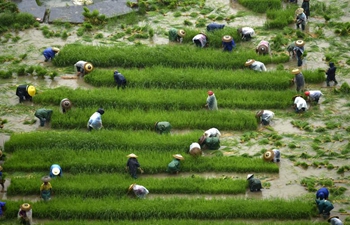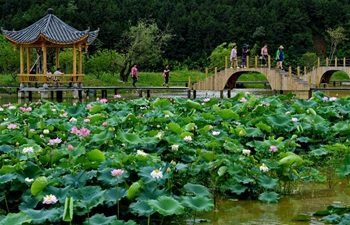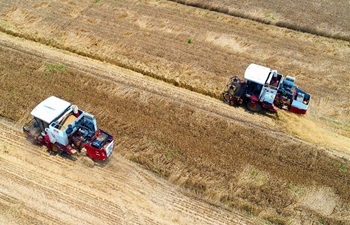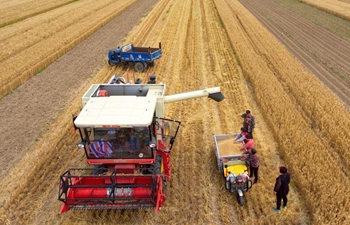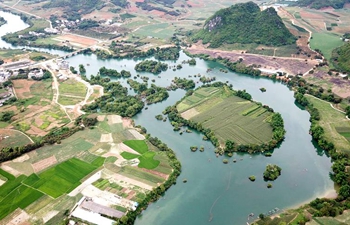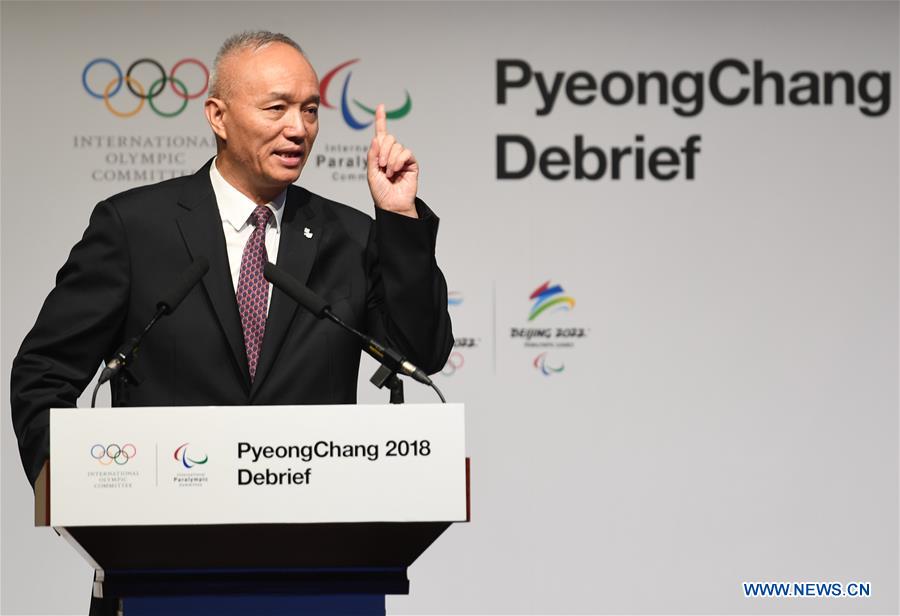
Cai Qi, the president of the Beijing 2022 Organizing Committee, speaks at the opening session of the PyongChang 2018 Debrief meeting in Beijing on June 4, 2018. The PyeongChang 2018 Debrief started at the headquarters of the Beijing Organising Committee for the 2022 Olympic and Paralympic Winter Games on Monday to share expertise, experience, and best practices for hosting the Games. (Xinhua/Zhang Chenlin)
BEIJING, June 5 (Xinhua) -- The PyeongChang 2018 Debrief started at the headquarters of the Beijing Organising Committee for the 2022 Olympic and Paralympic Winter Games on Monday.
According to international practice, as one Olympic Games ends, a debriefing will be held in the host city of the next Olympic Games to share expertise, experience, and best practices for hosting the Games.
Following the work arrangements of the International Olympic Committee (IOC) and the International Paralympic Committee (IPC), the PyeongChang 2018 Debrief is scheduled to take place from June 4 to June 8.
The debriefing's theme is "Learning Week: Towards the New Era" and it is held to improve the organizational capacity of Beijing 2022 by transferring knowledge from PyeongChang 2018 to Beijing 2022.
To communicate and implement the reforms of the New Norm formulated by the IOC, the debrief will hold a series of strategic and operational learning sessions to train international professionals and to promote knowledge exchanges and cooperation between Beijing 2022 and relevant international organizations, National Olympic Committees (NOCs) and previous and future Organising Committees for the Olympic Games.
Cai Qi, the president of the Beijing 2022 Organizing Committee, delivered a speech at the opening session, saying the 2018 PyeongChang Olympic and Paralympic Winter Games featured good organization and operation, notable technological highlights, and a rich cultural ambience. The Games has created multiple historical records and was a resounding success, leaving a deep impression on the rest of the world.
Cai also extended a warm welcome to all representatives of the IOC, the IPC as well as all the international federations who were invited to the start of the debriefing. Also at the debriefing were the PyeongChang Organizing Committee for the 2018 Olympic and Paralympic Winter Games (POCOG), the Tokyo Organizing Committee for the 2020 Olympic and
Paralympic Games, and the Paris Organizing Committee for the 2024 Olympic and Paralympic Games.
Cai pointed out that it is of particular significance that the debriefing was held in the Shougang Industrial Park. The Shougang Group, one of China's largest steel enterprises, put an end to its production in the park years ago and relocated the production base in a bid to implement the national strategy of structurally upgrading the steel industry in order to improve Beijing's air quality, and support the preparations for the Beijing 2008.
To promote the protection and utilization of the old industrial site, Beijing 2022 decided to base its head office in the Shougang Industrial Park, and now the workshops have been transformed into modern office buildings.
"Now, the renovation of Shougang Industrial Park's office area has been completed. The office area has taken on a new look to embrace new development opportunities. In addition to the ongoing construction of the Ice Sports Training Base of the General Administration of Sport of China and the Snowboard Big Air venue, we also plan to build an Olympic Winter Games Museum in the Shougang Industrial Park," Cai said.
"By doing so, we aim to vigorously promote the transformation and development of Shougang Industrial Park and make it a benchmark for the city's regeneration. These steps are in line with the reform spirit of Olympic Agenda 2020 and with the main purpose of the New Norm of the IOC," Cai added.
Thomas Bach, the President of the IOC, said in his speech that Beijing 2022 will be the first host city to fully benefit from Olympic Agenda 2020, which places great emphasis on incorporating legacy planning from the earliest stages of preparations for the Olympic Games.
"This is where Beijing 2022 is in a position to build on its legacy from 2008. Among the 12 competition and non-competition venues in the Beijing zone, 11 are legacy venues from the Olympic Games Beijing 2008," Bach said. Bach said another great example of Olympic Agenda 2020 in action is in the Shougang Industrial Park. The former steel mill site was closed in 2008 before the Olympic Games because of air pollution concerns.
Now this former industrial area is going through a regeneration, housing the Beijing 2022 Organizing Committee's headquarters and it will be venue for the Big Air competitions in 2022.
"Shougang illustrates in a great way how Beijing 2022 is building on the legacy of 2008. It is an impressive example of urban planning and renewal. The IOC is pleased that Beijing 2022 intends to use the Games as a catalyst to improve the health of the population, tackle environmental issues and promote sustainable economic growth in the region. These are all objectives in the spirit of Olympic Agenda 2020 to make the Olympic Games fit into the long-term development plan of a city and region," Bach said.
Andrew Parsons, President of the IPC, and Lee Hee-beom, President of the POCOG also addressed the opening session.
"I hope this week we can showcase PyeongChang 2018's successes before setting ourselves new objectives for what we want to achieve at Beijing
2022 and beyond, while keeping the recommendations of the New Norm [in the] front of [our] minds," Parsons said.
"As president of PyoengChang Organizing Committee, I would like to share my knowledge and experience with the Beijing Organizing Committee to make a success of Beijing 2022." Lee said.
The debriefing, which will last for five days, includes strategic and operational sessions. In addition to the opening and closing sessions, the strategic part will consist of topical sessions of six modules. The operational part will have 15-module sessions for 10 panels. During the debriefing, various functional areas of Beijing 2022 will hold a range of side meetings with the IOC, IPC and POCOG.




